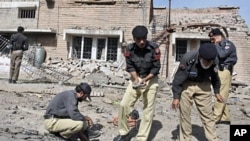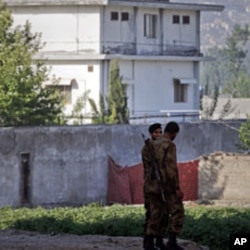The Pakistani Taliban say they are responsible for a deadly bomb attack on two U.S. consulate vehicles in the northwestern city of Peshawar. The militant group said Friday's violence was in revenge for the U.S. raid that killed al-Qaida leader Osama bin Laden in Pakistan earlier this month.
The blast in Peshawar occurred in the morning hours as U.S. personnel were traveling to work at the American consulate in a two-vehicle, armored convoy.
U.S. Embassy spokesman Alberto Gonzalez said Pakistani authorities are investigating the incident.
"On the road they were attacked by an improvised explosive device which exploded and damaged one of the vehicles, the two personnel inside were slightly injured," said Gonzales.
Pakistani officials say the blast killed one local bystander and wounded at least 11 other people.
The Pakistani Taliban claimed responsibility for the attack and warned of further violence.
The attack is the first targeting Westerners in Pakistan, since U.S. special forces killed bin Laden during a May 2 raid in the Pakistani city of Abbottabad.
There have been other deadly attacks claimed by the Taliban in the meantime, including twin suicide bombings last week that killed more than 80 recruits at a police academy in the country's northwest.
In Pakistan, there is widespread concern that militant backlash to the U.S. raid would be felt most severely by Pakistanis. As security analyst and former Pakistani ambassador to Afghanistan Rustam Shah Mohmand puts it, it is the average man on the street in Pakistan who is suffering the most in the fight against terrorism.
"It is the Pakistanis who are suffering -- who have been suffering now for many years. The common man, poor people, the rank-and-file Pakistanis are bearing the brunt [of the violence]," said Mohmand.
Mohmand says the extremist movement has lost considerable public support due to its violent campaigns in the past. The former ambassador says this lack of support, coupled with Pakistan's counterterrorism efforts, means there is little chance of a coordinated, sustained terror campaign to avenge bin Laden's death.
"There is no established hierarchy. The resources are not there," Mohmand said. "The community support which is wider is not there. So whereas there will be sporadic, haphazard attacks - here and there - but an organized campaign, pursued in an organized way - over a period of time does not look to me to be a possibility."
Regardless, the Pakistani Taliban has demonstrated the ability to launch attacks throughout the country for the past several years. The frequency of attacks has prompted the Pakistani military to engage the militants in an extended campaign against their strongholds in the country's northwest.

















